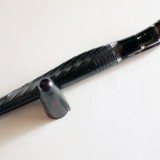Beat Your Royalties with Amazon Associates
Every author should belong to Amazon’s affiliate program, Amazon Associates. With Amazon Associates, you can create a link which includes your unique tracking ID to a book (or any product) and get a percentage of the purchase from anyone who clicks through to Amazon from your link. You can create links to any product on Amazon, but the essential products to link to are your own books. When someone clicks through from your site to Amazon and buys your book, you get paid twice: once from Amazon, and again from your publisher in the form of royalties.
And here’s the kicker — your commission ranges from 4% to 8.5%, which means that, depending on how many sales you achieve and what your agreement with your publisher is, you may end up making more from Amazon sales than you do from your royalties! Look:
Royalties: If you sell a book at $19.99, and get 5% of the wholesale price (usually 60% of the cover price), you’ll make .05 x .60 x $19.99 = $0.60. If you sell 100 copies, you’ll make $60 in royalties.
Amazon Associates: The same book might be marked down at Amazon to $15.99. If you sell one copy, you get 4% of 15.99, which is $0.64. If you sell 100 books, your commission is 6.5%, which nets you $1.04 per copy, or $104 for 100 books. Of course, you still get royalties on those books, too.
To create a link, you can log into your Amazon Associates account and select from dozens of “Widgets”, including ones that will scan your page and automatically create banners targeted towards the keywords on your page (it’s called Omakase). I don’t generally like their widgets, though they’re ok as ads to run in your site’s sidebar. Usually, I create links manually, by adding my associate ID to the end of the URL for a product page. Here’s how:
- Search for a product. For illustration, we’ll use my book Anthropology at the Dawn of the Cold War.
- Go to the product’s main page and copy it’s URL. For my book, it’s: http://www.amazon.com/Anthropology-at-Dawn-Cold-War/dp/0745325866/ref=pd_bbs_sr_1?ie=UTF8&s=books&qid=1203705368&sr=8-1
- See that string of numbers after the title and before where it says “ref=pd_bbs_sr_1…”? We only need the link up to there, so cut everything after the slash.
- The new URL looks like this: http://www.amazon.com/Anthropology-at-Dawn-Cold-War/dp/0745325866/
- That’s enough to find the book with, but it doesn’t have my associate ID attached yet. My associate ID code is “dwax-20”, and I’ll just add it to the end — Amazon is really good at picking out your associates ID.
- The new URL looks like this: http://www.amazon.com/Anthropology-at-Dawn-Cold-War/dp/0745325866/dwax-20. Clicking that link will take you to the exact same page, but I’ll get credit if you buy the book. In fact, I’ll get credit if you decide not to buy it and buy something else, instead, as long as you entered the site using my link.
Barnes and Noble also has an affiliate program, if you prefer working with them for whatever reason. I find Amazon’s to be far more useful (in terms of providing value to website visitors) but in the end, it’s links to books — and whichever company you feel offers the best combination of value and compensation should get your traffic. Borders recently “divorced” Amazon, launching it’s own online bookstore after several years of fulfilling orders through Amazon. Their affiliate program, then, is only just getting off the ground, but if you prefer Borders, that’s the way to go.
Use your affiliate link wherever you promote your book — on your website, in your email signature, on forums, anywhere you can paste a link. Obviously the vast majority of your sales will not come from you telling people where to find your book, but if you’re an active promoter, a significant number of sales will come from your link, which will be a nice bonus above your regular royalties — and you won’t have to wait a year to collect, either.






I’ve used their program for quite awhile. I’ve made some, not a lot. The interface though is very user-friendly. With WordPress also having plug-ins for Amazon Associate sales, it doesn’t make sense not to use it.
I used to run a book search site, and I’d recommend adding links for all three major stores (Amazon, B&N, and Borders). 8 times out of 10 Amazon will work but some people just prefer to shop elsewhere.
Also, BookSense just changed their name to IndieBound (www.indiebound.org). Books purchased through that program benefit independent booksellers. As a former card carrying member of the ABA, I always kept a BookSense link too (although they were not so great with the tracking and payout).
I think something is wrong with the math, or I am not understanding this correctly.
If something is 60% off retail, then it is 40% of the original price.
40% of $20 = 8, where in your example you are multiplying by 60%. Could clarify? I have no knowledge of wholesale prices for books, but my mother is an author and I am interested in your GREAT idea!